In addition to their coursework, students contribute legal scholarship on issues they are passionate about. Sometimes these start as a course paper and then are expanded; sometimes it’s work completed as a research associate with faculty or CLEE; sometimes it’s a blog post or other that the students take on independently. We are proud to showcase them and their original work on environmental and energy issues.
June 2023
Jill Nichols
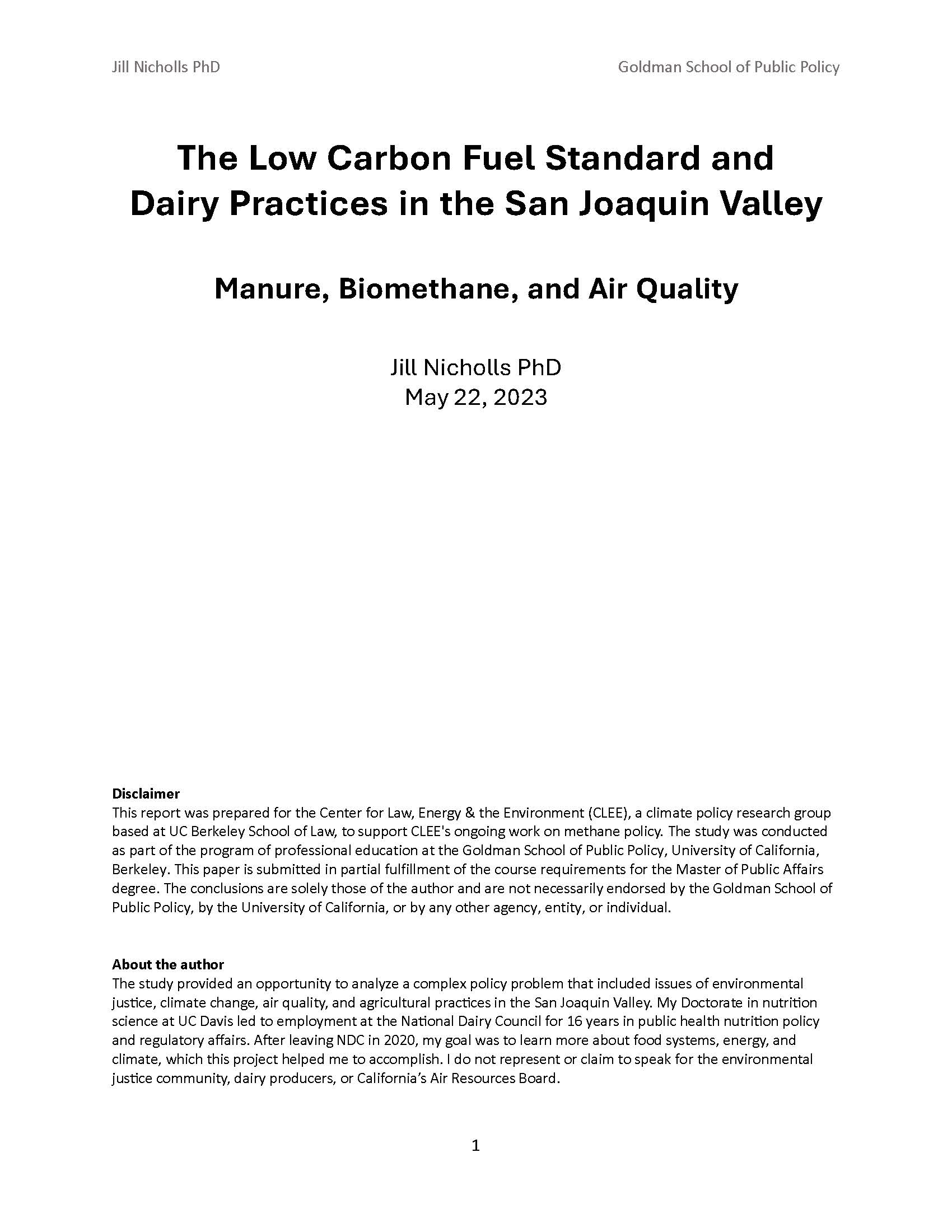
California has set ambitious targets to reduce emissions of methane, a highly potent greenhouse gas, including a specific target and set of programs for methane from dairies, which are the single highest source of emissions in the state. One of these programs, the Low Carbon Fuel Standard (LCFS), allows dairies to generate valuable credits from the sale of biogas as a transportation fuel. While state regulators credit the LCFS with helping to reduce California’s dairy methane emissions, environmental justice advocates have raised significant questions around its underlying calculations, the incentives it creates for consolidation of dairy herds, and its impact on air and water quality in environmentally impacted communities of the San Joaquin Valley. This report analyzes the LCFS program’s structure, the claims of different key stakeholders, and potential program improvements to address climate, air quality, and environmental justice challenges.
This work was completed by Goldman School of Public Policy student Jill Nichols ’23 under the supervision of CLEE research fellows Gil Damon and Ted Lamm.
September 2022
Analyzing Environmental Decision-Making of Trump-Appointed Federal Judges
Grayson Peters, Richard Yates
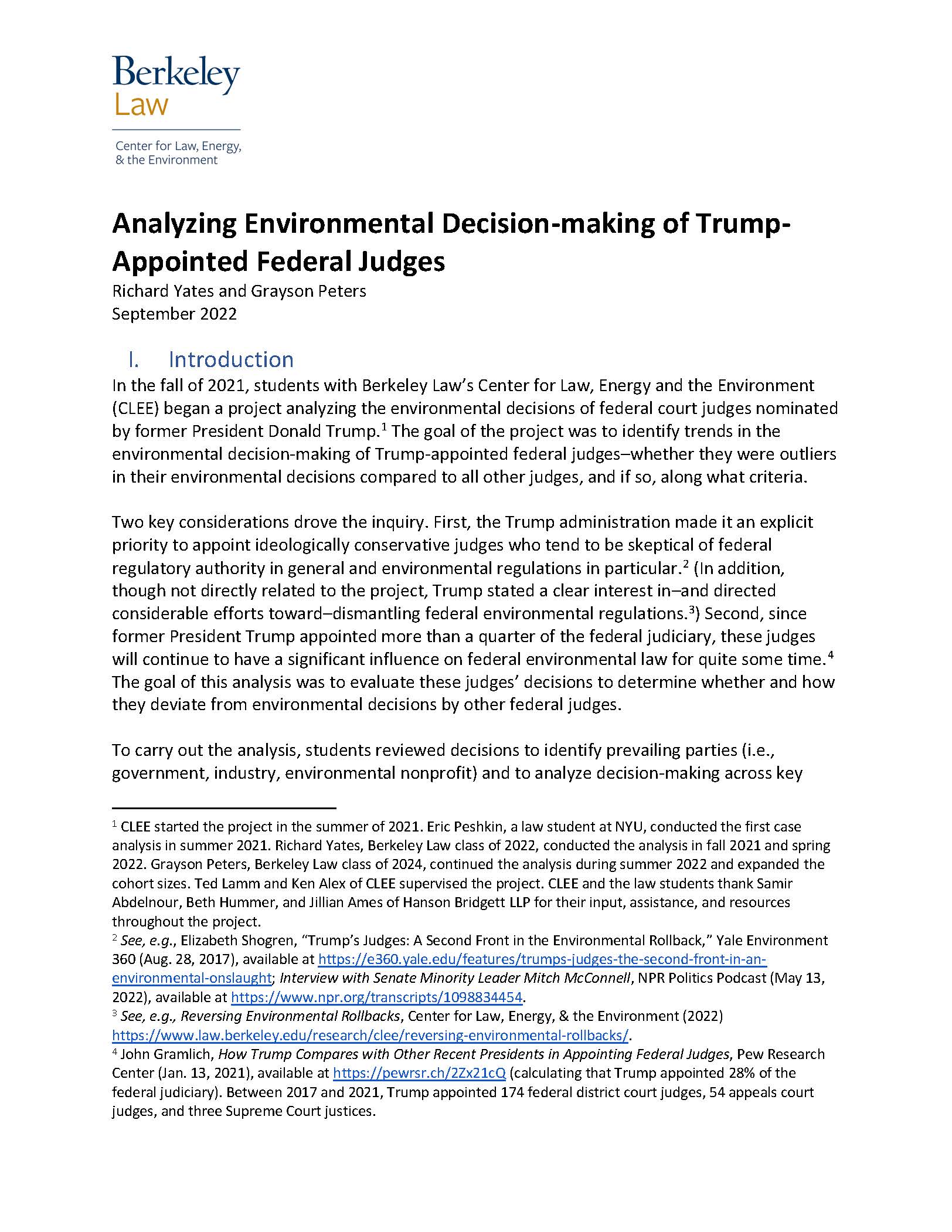 Between 2017 and 2021, President Trump appointed hundreds of judges to United States District, Circuit, and Supreme Courts, totaling over one quarter of the federal judiciary. Trump, Senate Majority Leader Mitch McConnell, and allies including the Federalist Society made clear that these appointments would target a long-term set of limited-government, deregulatory goals. In this analysis, Berkeley Law students compared hundreds of decisions in environmental cases of Trump-appointed judges against those of all other federal judges, with a particular focus on discrete criteria including prevailing parties, standing, and deference to lower courts and agency decisions. The students found that a few key discrepancies stand out–including, most significantly, deference.
Between 2017 and 2021, President Trump appointed hundreds of judges to United States District, Circuit, and Supreme Courts, totaling over one quarter of the federal judiciary. Trump, Senate Majority Leader Mitch McConnell, and allies including the Federalist Society made clear that these appointments would target a long-term set of limited-government, deregulatory goals. In this analysis, Berkeley Law students compared hundreds of decisions in environmental cases of Trump-appointed judges against those of all other federal judges, with a particular focus on discrete criteria including prevailing parties, standing, and deference to lower courts and agency decisions. The students found that a few key discrepancies stand out–including, most significantly, deference.
This work was completed by Berkeley Law students Richard Yates ’22 and Grayson Peters ’24 under the supervision of CLEE’s Ken Alex and Ted Lamm.
October 2021
Expanding CalEnviroScreen as a Tool for Environmental and Public Health Resilience
Kyralai Duppel, Ananya Subramanian, Emily Woods
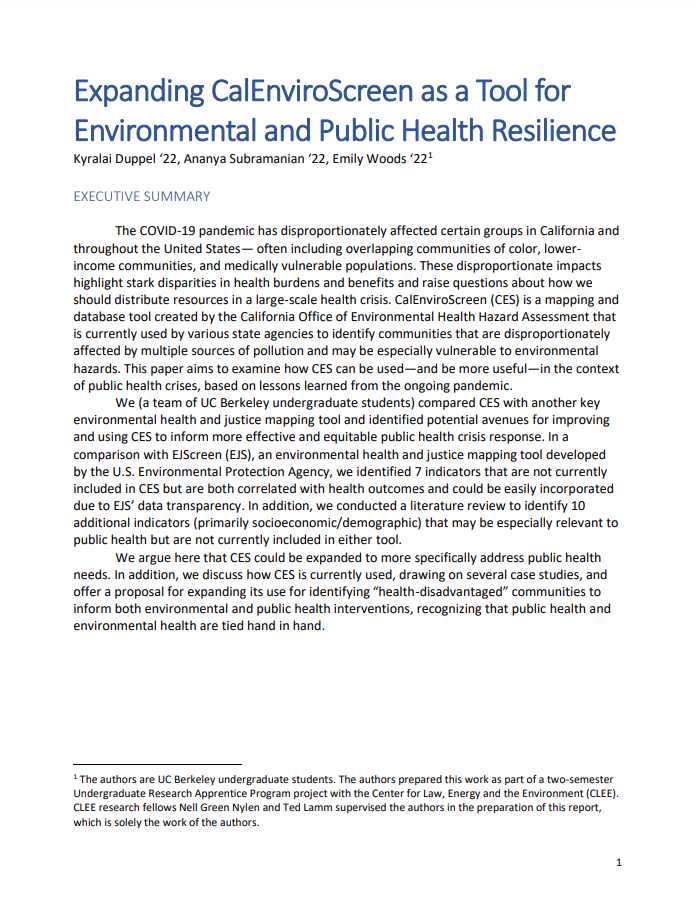 The COVID-19 pandemic has highlighted the myriad ways in which environmental, socioeconomic, and public health factors are inextricably linked. The crisis has also brought attention to a number of factors–from household size to wifi access–as newly important environmental and public health determinants. In this analysis, UC Berkeley undergraduates study CalEnviroScreen, California’s tool for mapping environmental health impacts and priorities, and propose ways to expand and update it to better reflect the new environmental and public health reality.
The COVID-19 pandemic has highlighted the myriad ways in which environmental, socioeconomic, and public health factors are inextricably linked. The crisis has also brought attention to a number of factors–from household size to wifi access–as newly important environmental and public health determinants. In this analysis, UC Berkeley undergraduates study CalEnviroScreen, California’s tool for mapping environmental health impacts and priorities, and propose ways to expand and update it to better reflect the new environmental and public health reality.
This work was completed by UC Berkeley undergraduates Kyralai Duppel, Ananya Subramanian, and Emily Woods ’22 under the supervision of CLEE research fellows Nell Green Nylen and Ted Lamm.
May 2021
Building Better: Envisioning a Just, Renewable Future from Coast-to-Coast
Samantha Murray
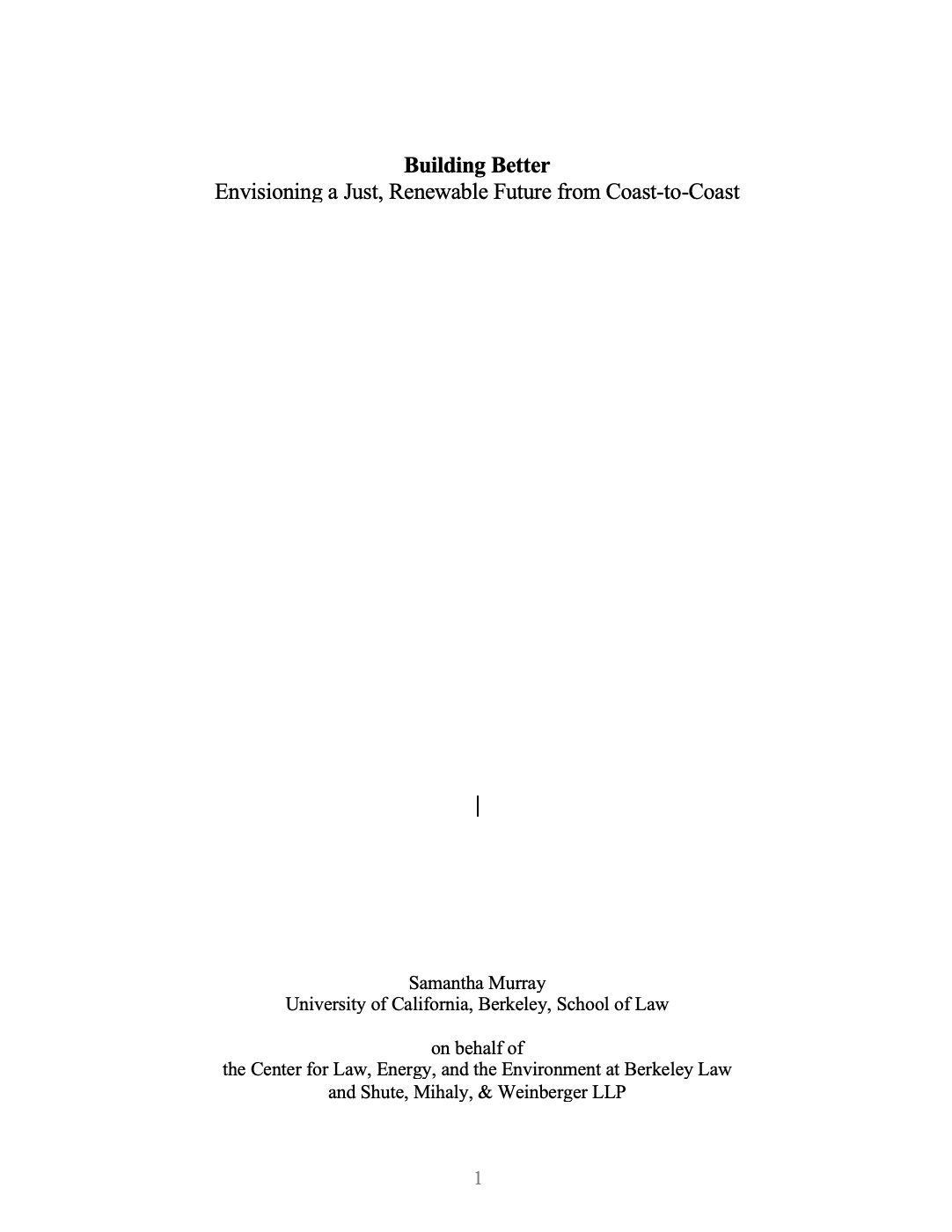 This report begins by laying out the status quo of energy usage and greenhouse gas emissions in both New York and California at the state level, as well as in New York City and San Francisco at the city level. Second, it summarizes the climate laws each region has passed, and which parts of the legislation are likely to succeed or pose challenges. Within these challenges, special attention is given to affordability and environmental justice concerns. Finally, it identifies areas for further study, and asks how the COVID-19 crisis will affect efforts toward de-carbonization moving forward.
This report begins by laying out the status quo of energy usage and greenhouse gas emissions in both New York and California at the state level, as well as in New York City and San Francisco at the city level. Second, it summarizes the climate laws each region has passed, and which parts of the legislation are likely to succeed or pose challenges. Within these challenges, special attention is given to affordability and environmental justice concerns. Finally, it identifies areas for further study, and asks how the COVID-19 crisis will affect efforts toward de-carbonization moving forward.
This work was completed on behalf of the Center for Law, Energy, and the Environment at Berkeley Law and Shute, Mihaly, & Weinberger LLP.
May 2021
Reversing Trump Environmental Rollbacks: A 100 Day Analysis on the Biden Administration’s Reversals
Clara Barnosky, Jane Sadler, Richard Yates, Zachary Zimmerman
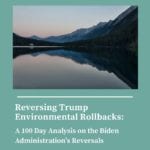 A team of law and public policy students working under CLEE’s guidance developed a report analyzing the environmental actions of President Biden’s first 100 days in office. Drawing on the environmental rollbacks database compiled during the Trump administration, the team began tracking the reversals of those actions during the Biden administration’s first 100 days. This report provides a broad overview and analysis of reversal actions taken by the administration, as well as a more detailed look at the four agencies that account for a majority of the actions. It also provides in-depth case studies on a few specific reversals that reflect broader trends on reversals within the new administration, and identifies potential areas where additional work is needed.
A team of law and public policy students working under CLEE’s guidance developed a report analyzing the environmental actions of President Biden’s first 100 days in office. Drawing on the environmental rollbacks database compiled during the Trump administration, the team began tracking the reversals of those actions during the Biden administration’s first 100 days. This report provides a broad overview and analysis of reversal actions taken by the administration, as well as a more detailed look at the four agencies that account for a majority of the actions. It also provides in-depth case studies on a few specific reversals that reflect broader trends on reversals within the new administration, and identifies potential areas where additional work is needed.
This work was completed as part of CLEE’s Reversing Environmental Rollbacks project under the supervision of Research Fellow Ted Lamm.
April 2021
Greater Than the Sum- Sub-national Renewable Energy Policy during the Trump Administration
Jetta Cook
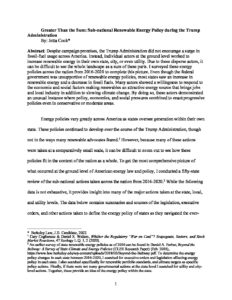 Despite campaign promises, the Trump Administration did not encourage a surge in fossil-fuel usage across America. Instead, individual actors at the ground level worked to increase renewable energy in their own state, city, or even utility. Due to these disperse actors, it can be difficult to see the whole landscape as a sum of these parts. This report surveyed these energy policies across the nation from 2016-2020 to complete this picture.
Despite campaign promises, the Trump Administration did not encourage a surge in fossil-fuel usage across America. Instead, individual actors at the ground level worked to increase renewable energy in their own state, city, or even utility. Due to these disperse actors, it can be difficult to see the whole landscape as a sum of these parts. This report surveyed these energy policies across the nation from 2016-2020 to complete this picture.
June 2020
Resilient Coasts: Grid Resilience Threats and Opportunities
Naomi Wheeler
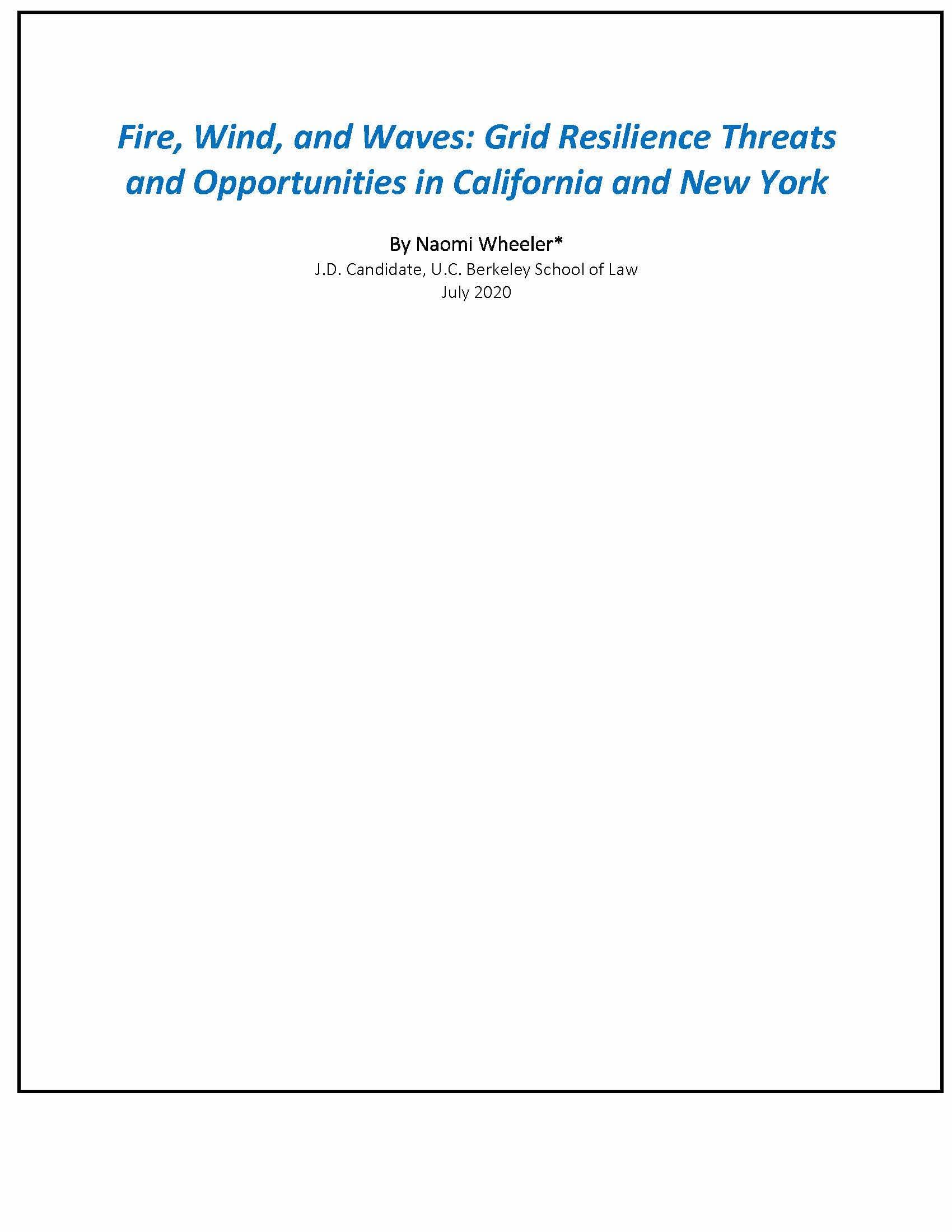 Electrical grids across the United States face a complex and overlapping series of threats. Aging grid infrastructure, coupled with under-investment in maintenance and repairs, has created a precarious situation for many electrical systems. This report presents two case studies of grid resilience in 2020, providing a detailed analysis of the unique threats to and opportunities for electrical grids in California and New York.
Electrical grids across the United States face a complex and overlapping series of threats. Aging grid infrastructure, coupled with under-investment in maintenance and repairs, has created a precarious situation for many electrical systems. This report presents two case studies of grid resilience in 2020, providing a detailed analysis of the unique threats to and opportunities for electrical grids in California and New York.
Check out Naomi’s related Legal Planet post, States and Cities Should Prioritize Equity While Building Grid Resilience.
This work was completed under the supervision of Professor Dan Farber, as part of a research initiative with the Australian Research Council for a US-AU study of making the grid climate resilience.